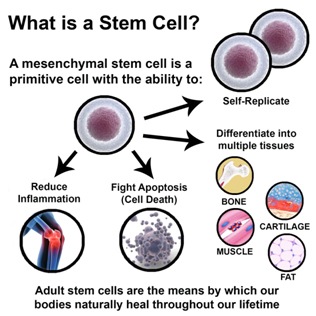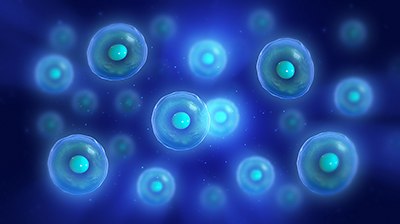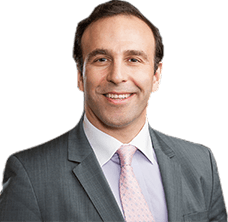Stem Cell Therapy
Scientists and doctors have made tremendous advances in moving regenerative medicine into the mainstream as a treatment for many diseases and disorders. Regenerative medicine takes advantage of our natural ability to heal ourselves by using the healthy adult stem cells found throughout the body. Laboratory and clinical research has shown that it is possible to use adult stem cells to restore lost, damaged or aging cells to effectively regenerate tissue and provide some patients with an alternative to surgery. Regenerative therapies are showing promise in orthopedic medicine, wound care, nerve restoration, and a variety of cardiovascular, neuromuscular, and autoimmune conditions.

Stem Cell Therapy
What are Adult Stem Cells?
Adult stem cells were discovered over 40 years ago when researchers found that cells derived from bone marrow had the ability to form various tissues. Adult stem cells are early stage cells that, under the right conditions, are capable of developing into other types of cells and hold the potential to regenerate damaged tissue.

AUTOLOGOUS ADULT STEM CELLS (ASCS) are being used to treat many types of chronic pain and degeneration. Currently doctors are treating shoulder, knee, hip, and spine degeneration, in addition to soft tissue (muscle, tendon, ligament) and other bone related injuries.
Who is a Good Candidate for a Stem Cell Procedure?
The first step is to determine if you are a good candidate for an adult stem cell procedure. Your physician will want a history of your injury and a physical examination along with any x-rays, and an MRI. While stem cell therapy maybe appropriate for certain conditions, it is not applicable for every condition. However, it is has proven to be a viable option for several individuals suffering from pain. Good candidates for adult stem cell treatment usually are:
- A patient that wants to avoid the inherent complications that come with an invasive surgical procedure
- A pain sufferer that is interested in an option that offers potential for an overall improved quality of life
- A person who understands that surgery sets off a cascade of further degeneration, and is prepared to benefit from the body’s own regenerative mechanisms.
Every patient is different, the success of the stem cell therapy is dependent on the severity of your condition and your body’s response to stem cell therapy.
Overview of the Procedure
An adult stem cell procedure harnesses’ and amplifies the body’s natural mechanism for healing and anti-inflammation. Once you have been identified as a good candidate for the procedure, a member of our team will review the procedure with you and answer any questions that you may have. A brief overview of the procedure is below:
- This mechanism uses adult autologous stem cells, derived from your own bone marrow.
- In the procedure, the physician will aspirate these cells from your hip, concentrate them, then deliver them back into your body in the area of damage or injury to aid in natural healing.
- In all, the process takes less than 45 minutes and the concentration of the cells takes about 12-14 minutes.
- Because your procedure will utilize a concentrated serum of your own cells, the procedure is considered “autologous point-of-care”.
Once the procedure is complete, our staff will allow you to rest and will create a customized personal rehabilitation program for recovery. We will either ask you to come back for a few post-operative appointments or follow up with you by phone, email, or mail so we can track you healing progress.
Potential Applications
- The spine is comprised of a team environment working together to provide function and mobility to the body. If an area of the neck or back is injured, the entire structure begins to compensate for the injury causing stability and function to decline. Creating the need to relieve this pain:
- Possible conditions for treatment are: discogenic back pain, facet arthritis and degenerative disc disease.
- Your shoulder is involved in small and large movements throughout the day. Shoulder injuries can be the result of the tiniest movements from writing to driving a car. Most people do not even know they are suffering from a shoulder injury. Once the injury is identified the pain can become intolerable. Creating the need to relieve this pain:
- Possible conditions for shoulder treatments are partial rotator cuff tears, labral tears, and mild to moderate osteoarthritis
- The knee joint is used in almost all motion and over time will begin to degenerate from overuse. Knee pain can be extremely pain full and challenging for anyone suffering from joint pain. Creating the need to relieve this pain:
- Possible conditions for knee treatment are osteoarthritis, partial ligament tears: ACL & PCL, partial meniscal tears, and augmented ACL or PCL reconstruction
- Foot and ankle injuries often occur. Over time, we collect scars making it difficult for our body to heal on its own. The constant pressures we cause with simples, line walking or stretching, often exasperate the injury. Creating the need to relieve this pain:
- Possible conditions for treatment: are mild to moderate osteoarthritis, tendon inflammation, partial achilles tendon tear, and muscle strain/sprain.
- The constant motion of walking, running, biking or climbing involves our hips. The compression of these movements starts to wear on all our joints over time. In addition, the hip’s have a tendency to carry much of the burden on our body’s motions and pain. Creating the need to relieve this pain:
- Possible conditions for treatments are: osteoarthritis, laberal tears, articular cartilage injuries and conginetal deformities of the hip
Frequently Asked Questions (FAQs)
Q: What are adult stem cells?
A: Adult stem cells are unspecialized or undifferentiated cells, capable of two processes: self-renewal and differentiation. They are vital to maintaining tissues in the body such as internal organs, skin, and blood.
Q: What is Regenerative Medicine?
A: Regenerative Medicine is a new and advancing scientific field focused on the repair and regeneration of damaged tissue utilizing stem cells.
Q: What is the difference between adult stem cells and embryonic stem cells?
A: Adult stem cells are found in mature adult tissues including bone marrow and fat, while embryonic stem cells (ESCs) are not found in the adult human body. ESCs are obtained from donated in vitro fertilizations, which raises many ethical concerns. Because ESCs are not autologous, there is a possibility of immune rejection. Adult stem cells do not raise ethical issues nor pose any risks for immune rejection.
Q: Does Dr. Jazrawi use embryonic stem cells in clinical procedures?
A: No, Dr. Jazrawi’s approach to cell therapy relies only on autologous adult stem cells isolated from the patient during surgery. He does not participate in embryonic stem cell research or use embryonic stem cells in clinical applications.
Q: Are there ethical issues associated with harvesting adult stem cells?
A: No, adult stem cells do not raise ethical questions as they are harvested from the patient’s body.
Q: Are there cancer-causing risks associated with adult stem cell treatments?
A: No. Where embryonic stem cells have been shown to form teratomas (germ cell tumors), there is no data that suggests adult stem cells have the same potential to promote the development of tumors.
Q: Where do adult stem cells come from?
A: In adults, stem cells are present within various tissues and organ systems, the most common being bone marrow and adipose or fat tissues. Other sources include the liver, epidermis, retina, skeletal muscle, intestine, brain, placenta, umbilical cord and dental pulp.
Q: How does Dr. Jazrawi obtain adult stem cells for use in cell treatment?
A: Dr. Jazrawi currently has a system that uses adult stem cells from bone marrow and these stem cells are obtained through aspiration during your procedure.
Q: How are adult stem cells used in surgical procedures?
A: Adult stem cells are used to treat patients with damaged tissues due to age or deterioration. During a procedure, stem cells are isolated from the patient, concentrated and delivered back to the site of injury to assist in the healing process.
Q: Are there different types of adult stem cells?
A: Yes, there are many types of adult stem cells found in the body, which have variable differentiation potentials. The adult stem cells that aid in the repair of damages tissue are multipotent, mesenchymal stem cells. These are located in bone marrow and adipose (fat) tissue.
Q: Are the harvested adult stem cells expanded in a laboratory setting prior to delivery back to the patient?
A: No, Dr. Jazrawi does not use in vitro expansion. The cells are harvested, processed in the operating room and delivered back to the patient at point of care.
Q: How do stem cells know what type of tissue to develop into?
A: The differentiation of stem cells is dependent on many factors, including cell signaling and micro-environmental signals. Based on these cues, stem cells are able to develop into healthy tissue needed to repair damaged tissue. For example, multipotent stem cells delivered to damaged bone will develop into bone cells to aid in tissue repair. The exact mechanism of lineage-specific differentiation is unknown at this point.
Q: Will my body reject the stem cells?
A: No, adult stem cells are autologous and non-immunogenic.
Q: Is stem cell therapy safe?
A: Yes, and ask your doctor what clinical studies have been done to show that stem cells are safe and effective.
Q: Where are stem cells currently being used?
A: Stem cells are currently being used in both laboratory and clinical settings. Laboratories are using human and animal derived stem cells to conduct in vitro studies as well as in vivo studies with small and large animals. Autologous adult stem cells are currently being used in hospitals and clinics during surgery to aid in the repair of damaged tissues.
Q: How long will the stem cells last?
A: It will depend on your injury, the area that is treated and your response to the therapy.
Q: What is the recovery like after a stem cell procedure?
A: If you have a joint injection, you typically can go back to work. It is advised to limit load bearing activities for at least 2 weeks. If you had disc injections, you should take it easy for a few days. Non-steriodal, anti-inflammatory medications (NSAIDS) should be withheld for 72 hours pre-procedure and one week after the procedure.
Q: What is the difference between autologous and allogeneic cells?
A: Autologous cells are taken from the same patient, typically at point-of-care. Allogeneic cells are taken from another patient and are often manipulated before they are given to another patient.
Q: Why use adult stem cell therapy rather than pharmaceuticals or genetic treatments?
A: Adult stem cells are from the body and generate natural proteins and therapeutic biochemicals, decrease inflammation, are anti-bacterial, and recruit other cells to heal the injured site. Pharmaceutical treatments only provide drugs with minimally effective dosages that may cause unwanted side effects. Over dosage can be dangerously toxic or even carcinogenic. Genetic therapy is still unproven and serious concerns exist about it causing cancer due to genetically manipulated cells.
Q: What is the difference between autologous and allogeneic cells?
A: Autologous cells are taken from the same patient, typically at point-of-care. Allogeneic cells are taken from another patient and are often manipulated.
Q: How much will it cost?
A: Most insurance will not cover stem cell procedures. Ask your doctor for payment options
![]() The use of Stem cells in Hip Therapies
The use of Stem cells in Hip Therapies
![]() The use of Stem cells in Knee Therapies
The use of Stem cells in Knee Therapies
![]() The use of Stem cells in Shoulder Therapies
The use of Stem cells in Shoulder Therapies
You will need the Adobe Reader to view and print the above documents. 


 Menu
Menu







